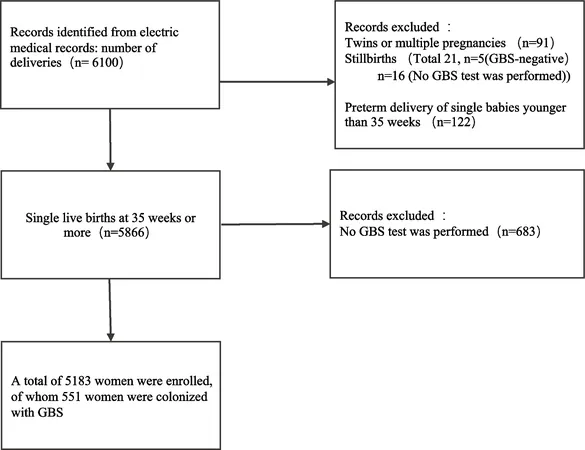
Alarming Links Uncovered Between Group B Streptococcus and Poor Maternal and Neonatal Outcomes: A Groundbreaking Retrospective Study
2025-01-21
Author: Jia
Introduction
Group B Streptococcus (GBS) colonization is a critical concern as it stands as a leading cause of severe infections in newborns. A comprehensive study was conducted to investigate GBS prevalence among pregnant women, identify potential risk factors, and understand the effects of GBS colonization on maternal and neonatal health outcomes.
Study Overview
A retrospective analysis was performed involving pregnant women who underwent GBS screening and gave birth between June 2020 and December 2022. Women in their 35th to 37th weeks of gestation were screened using real-time polymerase chain reaction (RT-PCR) to detect GBS. The research aimed to trace clinical characteristics and outcomes in mothers and their infants, analyze risk factors associated with GBS, and assess its impact on adverse outcomes using statistical methods.
Key Findings
The research unveiled that the overall rate of GBS positivity was recorded at 10.63%, with a notable screening rate of 88.4% among participants. It specifically highlighted that pregnant women with diabetes had a significant likelihood of being GBS carriers. The study's results indicated that GBS colonization was correlated with critical fetal health issues, including fetal distress and a host of severe neonatal conditions. This includes a staggering fivefold increased risk of neonatal sepsis for GBS carriers and elevated rates of low Apgar scores, pneumonia, and hyperbilirubinemia.
Conversely, the study did not establish a significant correlation between GBS colonization and adverse maternal outcomes. This finding sheds light on the need for enhanced monitoring of expectant mothers carrying GBS to mitigate risks to their newborns.
Global Context
Group B Streptococcus is not just a local issue; it represents a significant health threat globally. Diverse studies have pointed out the variation in maternal GBS colonization rates around the world, with estimates ranging from 11% to 35% across different regions. In mainland China, for instance, GBS positivity rates are documented between 3.7% and 14.52%. The prevalence of neonatal GBS disease remains a critical public health concern, demanding urgent attention.
Implications for Maternal Health
The strong association between diabetes and GBS colonization highlighted by this study necessitates that healthcare providers prioritize GBS screening, especially among diabetic pregnant women. Enhancements in monitoring glucose levels could significantly reduce the risk of GBS colonization and, in turn, provide better outcomes for both mothers and infants. Furthermore, the study emphasizes the importance of Intravenous Antibiotic Prophylaxis (IAP) as recommended by the Centers for Disease Control and Prevention (CDC), which has shown to effectively reduce the incidences of early-onset GBS disease in newborns.
Conclusion and Future Directions
This investigation presents crucial insights into the prevalence and impacts of GBS colonization among pregnant women, advocating for routine screenings and targeted interventions to improve maternal and neonatal health outcomes. The study's findings underscore the need for continued research and surveillance to address the multifaceted challenges posed by GBS, with a focus on preventive measures and health education to diminish adverse outcomes for mothers and their newborns both in China and globally.
Stay tuned for more updates as we unravel the complexities of maternal health and emerging infections impacting the next generation!



 Brasil (PT)
Brasil (PT)
 Canada (EN)
Canada (EN)
 Chile (ES)
Chile (ES)
 Česko (CS)
Česko (CS)
 대한민국 (KO)
대한민국 (KO)
 España (ES)
España (ES)
 France (FR)
France (FR)
 Hong Kong (EN)
Hong Kong (EN)
 Italia (IT)
Italia (IT)
 日本 (JA)
日本 (JA)
 Magyarország (HU)
Magyarország (HU)
 Norge (NO)
Norge (NO)
 Polska (PL)
Polska (PL)
 Schweiz (DE)
Schweiz (DE)
 Singapore (EN)
Singapore (EN)
 Sverige (SV)
Sverige (SV)
 Suomi (FI)
Suomi (FI)
 Türkiye (TR)
Türkiye (TR)
 الإمارات العربية المتحدة (AR)
الإمارات العربية المتحدة (AR)